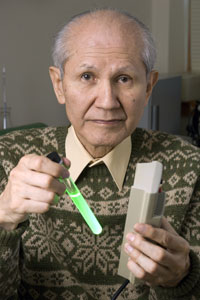MBL Scientist and Nobel Prize Winner Osamu Shimomura Elected to National Academy of Sciences

Contact: Gina Hebert 508-289-7725; ghebert@mbl.edu
MBL, WOODS HOLE, MA—Dr. Osamu Shimomura, a Distinguished Scientist and Corporation member at the Marine Biological Laboratory (MBL) has been elected to The National Academy of Sciences (NAS), an honorific society of distinguished scholars engaged in scientific and engineering research. The achievement, considered one of the highest honors in American science and engineering, was announced recently at the Academy’s 150th annual meeting in Washington, D.C. Dr. Shimomura is one of 84 new members and 21 foreign associates from 14 countries elected in recognition of their distinguished and continuing achievements in original research.
 Osamu Shimomura holds a test tube containing green fluorescent protein (GFP) in a water solution. He also holds a lamp that shines ultraviolet light, which causes the GFP to fluoresce bright green. Credit: Tom Kleindinst
Osamu Shimomura holds a test tube containing green fluorescent protein (GFP) in a water solution. He also holds a lamp that shines ultraviolet light, which causes the GFP to fluoresce bright green. Credit: Tom KleindinstDr. Shimomura was awarded the 2008 Nobel Prize in Chemistry for his discovery of green fluorescent protein (GFP), one of the most important tools in contemporary science and medicine for illuminating life at the microscopic level. He shared the prize with Martin Chalfie of Columbia University, and Roger Y. Tsien of University of California, San Diego.
"Dr. Shimomura’s pioneering discovery of GFP revolutionized biological imaging and ushered in a new era of research,” said Joan V. Ruderman, MBL President and Director of the MBL. “Having Dr. Shimomura as part of our institution is a source of tremendous pride for the entire MBL community and we are thrilled that his work has been recognized with this important honor.”
The Academy membership is composed 2,179 active NAS members, of whom nearly 200 have won Nobel Prizes. More than 200 Academy members (since 1960) have had associations with the MBL, either as members of the Corporation, investigators, faculty, or alumni.
Dr. Shimomura discovered GFP in the jellyfish Aequorea in 1961, while he was investigating the animal’s bioluminescent properties at Princeton University. With the help of his wife and research assistant, Akemi Shimomura, he collected about 850,000 specimens of Aequorea between 1961 and his retirement in 2001. Dr. Shimomura was the first person to purify both GFP and the bioluminescing protein, aequorin, from Aequorea, which he collected at Friday Harbor Laboratories, University of Washington.
Born in Kyoto, Japan in 1928, Dr. Shimomura graduated from Nagasaki College of Pharmacy in 1951 and worked as a research student in Organic Chemistry at the laboratory of Professor Hirata at Nagoya University from 1955 to 1958. He obtained his Ph.D. in organic chemistry from Nagoya University in 1960. He was a research biochemist at Princeton University from 1960 to 1982 and a senior scientist at the MBL from 1982 to 2001.
Dr. Shimomura has been a member of the MBL Corporation since 1988. In 2008 he was awarded the Order of Culture, the highest honor given annually by the Emperor of Japan, which recognizes high achievement in culture, the arts, or academia. In 2008 he also received the Person of Cultural Merit award from the Japanese government. In 2012 he received the inaugural Golden Goose Award, honoring basic science research that initially seems obscure but leads to findings with significant health and economic benefits. The award was created by a coalition of science organizations, including the American Association for the Advancement of Science. Most recently, he was elected as a Fellow of American Association of Cancer Research Academy.
Dr. Shimomura will be inducted into the Academy next April during its 151st annual meeting in Washington, D.C.
In addition to Dr. Shimomura, other inductees with an MBL association are former MBL course faculty Richard N. Aslin, University of Rochester; Ben A. Barres, Stanford University School of Medicine; Stephen M. Beverley, Washington University School of Medicine; Edward M. De Robertis, University of California, Los Angeles; Mary E. Lidstrom, University of Washington; and Gina Turrigiano, Brandeis University. In addition, former visiting investigator Robert H. Singer of the Albert Einstein College of Medicine of Yeshiva University was also elected. Winfried Denk, of the Max Planck Institute for Medical Research, a former faculty member and visiting investigator, and former faculty member Ruth S. Nussenzweig New York University School of Medicine were elected foreign associates.
—###—
The Marine Biological Laboratory (MBL) is dedicated to scientific discovery and improving the human condition through research and education in biology, biomedicine, and environmental science. Founded in 1888 in Woods Hole, Massachusetts, the MBL is an independent, nonprofit corporation.